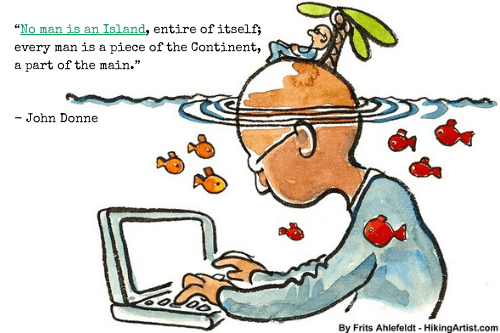
YouTube / iTunes / Spotify / Radio Public / Pocket Casts / Google Podcasts / Breaker / Overcast
Listen to ArtisanEnglish.jp posts & lesson intros here.
English Phrase: No man is an island
Today, I’ve chosen a ubiquitous phrase in English – no man is an island.
Of course, in our modern times, we must be inclusive and modify it to ‘no one is an island’ or ‘no woman is an island.’
However, to stay true to the original John Donne poem, I’ll introduce it as ‘No man is an island.’
So, what the heck does it mean?
Well, nobody can exist on this earth completely alone.
Humans are social creatures.
Sure, we have all heard about the strong silent types, the hikikomori and the ones who are not social butterflies but prefer to keep to themselves.
The truth is that we all need and depend on someone else at some time in our lives.
The strong, silent type can be healthy and silent until they become older and weaker.
Then, they need someone to take them to the hospital.
Hikikomori may isolate themselves from society until the 80 – 50 rule kicks in.
It usually means the hikikomori is in their 50s, and their caregivers are in their 80s and can no longer care for them.
Then, they need society to take care of them.
Even people like myself, who can put on their social butterfly hats and be quite social but generally keep to themselves, cannot be islands forever.
No man, or woman for that matter, is an island unto themselves.
We all need to be a part of society because that is how humanity has developed.
We are social creatures and need to be a part of a community.
Flesch-Kincaid Readability Test
This post is understandable by someone with at least an 8th-grade education (age 13 – 14).
On the Flesch-Kincaid reading-ease test, this post scores 69.
The higher the score on a scale of 0 – 100, the easier the passage is to read.

